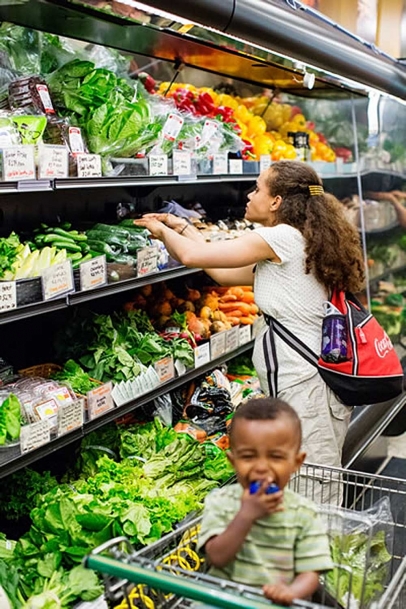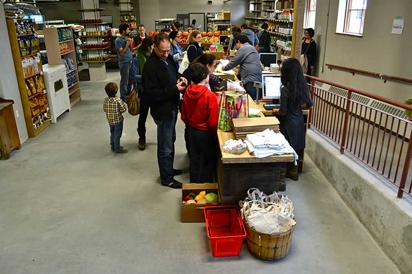Building a Food Co-Operative in Ontario
Hard work creates a beautiful gift that can be enjoyed by the entire community for years to come
Eight years ago, Alisa Smith and J. B. Mackinnon were blogging about their year of eating foods grown within a hundred miles of their Vancouver home. Their 100 Mile Diet experience served to persuade my husband Graham and me to eat from within one hundred miles of our home in downtown Hamilton. We gathered a handful of friends together for this challenge, which we first undertook in the month of October and then again in March (much harder).
At our weekly potlucks, we would talk about the difficulty of actually identifying where food comes from, the farmers we had met, new foods we had tried, and what we hoped to learn through this experiment. It was a both-feet-in education on our local food system which left all of us changed as to how we make our food choices.
Fast forward a few years. The challenges of eating local were still very much on our minds. We had adjusted our own food choices, started a community garden, and I sat on the Community Food Security Stakeholders Committee for Hamilton, but we still had a hard time finding a broad spectrum of local foods beyond what was available at farmers' markets and specialty stores.
Then we learned about a food co-op model in Vermont. The Buffalo Mountain Food Co-op in the small town of Hardwick is featured in Ben Hewitt's book, The Town that Food Saved. Like all co-ops, Buffalo Mountain practices the international principles of open and voluntary membership, democratic member control, emphasis on education, support of other co-operatives, concern for the greater community, and reinvestment of surplus to benefit members and their community. Buffalo Mountain not only sells everything a grocery store needs, but also has a tremendously positive atmosphere with a distinct focus on local foods. We thought, "This is what Hamilton needs!"
Co-ops are always willing to share information and we learned from many of them, through personal visits, research and conversations. In Ontario, the Local Organic Food Co-op Network (LOFC) is now connecting existing and emerging co-ops. LOFC animator Hannah Renglich says, "Everywhere I go, groups are looking for place-based solutions to their community's food challenges, and the co-op model is flexible enough to offer a solution to their identified needs, using their existing assets. I consistently find myself sharing tools that draw out the strengths and wisdom groups already possess, and connecting co-ops so that they can support each other with passion and inspiration."
Starting a food co-operative is a lot of hard work but is also incredibly rewarding. Co-ops come in all shapes and sizes, but one thing they have in common is strong community support and a determined group of volunteers. We've learned that co-op organizers are incredibly generous people who believe in a bigger vision and outcome than they could achieve on their own. Their hard work creates a beautiful gift that can be enjoyed by the entire community for years to come.
The Big Carrot and Karma co-ops in Toronto and the London Food Co-op are some of Ontario's well-established co-operative grocers. (The Big Carrot celebrated its 30th anniversary last year.) They have inspired new and emerging co-ops across the province, in places like Collingwood, Toronto, Penetanguishine, St. Catharines, Guelph, Huntsville and Almonte. If you have not yet visited one of Ontario's food co-ops, do! Each is unique, but all share a vision for strengthening their communities through services and education. But be warned: once you experience a food co-op, you'll want one in your neighbourhood! A bit of information about Ontario's newest co-ops is featured below.
Your Local Market Co-op, Stratford
Your Local Market Co-op opened in downtown Stratford in June 2011. Tired of short-term jobs in the area's seasonal hospitality industry, the founding entrepreneurs conducted a feasibility study to assess the viability of a local-foods grocer, and the final shape of the co-op was born out of that community feedback. "We decided very early on that it was vital for the long-term stability of the business that it be based around the needs of the community; the grocery store was really born out of that conviction," says Chris Walker, founding member and company president. "Our company's values reflect those of the community we serve." With an all-Ontario purchasing policy, a surprising diversity of local foods is available on their shelves, most of it from Perth County.
Your Local Market Co-op is structured as a worker co-operative; members are owners and work in the co-op's various businesses. The original venture has grown to include a bakery, coffee shop, and soon-to-open take-out restaurant. Chris continues, "The items we produce on-site reflect the skills the founding members bring from their food-service backgrounds. We offer training to new employees but opportunity is never limited to just one department. We feel the business is more stable, dynamic and interesting if employees have the opportunity to learn new skills. We also offer the chance to develop ideas into either a new department or new business without a lot of the risks this usually carries."
West End Food Co-op, Toronto (now closed)
The West End Food Co-op is a multi-stakeholder, not-for-profit co-op located in Toronto's Parkdale neighbourhood. Given the diversity of area residents, reducing economic barriers to healthy food is one of the co-op's key motivations. Co-op Coordinator James Partanen highlights their Co-op Cred program: "It allows partner organizations with funding to support the healthy food choices of their economically marginalized members by enabling them to shop with us. Our store and kitchen are a beehive of supportive education and employment opportunities for marginalized workers, partner program participants, and volunteers." West End's food-based initiatives extend beyond the co-op's shelves to include the year-round weekly Sorauren Farmers' Market, a community cannery, and a food-mapping project. James concludes, "Co-operative values allow us to support our economically diverse neighborhood by shifting the focus from profit to community support." The West End Food Co-op hub opened its doors in October 2012 after 5 years in development.
Collingwood Community Food Co-op, Collingwood
The Collingwood Community Food Co-op sprang to life with overwhelming local support in December 2012. Shelby Worts, a naturopathic doctor and one of the co-op's founders, recalls that, "We set out twenty chairs at our initial 'how do we get started?' meeting back in April 2012, [and] over a hundred people showed up!" The co-op's focus is on local and organic, non-genetically-modified foods. Shelby describes the gap that Collingwood previously had in its local-food system: "Our farmers' market is only open twenty-one mornings each year. We wanted accessibility to locally-grown or -processed foods the other 344 days of the year. We also wanted to support the local producers so they could continue to work their land and produce their foods." The co-op has already expanded its product line to provide a tasty lunch menu through its Sol Kitchen.
The Mustard Seed Co-operative Grocery, Hamilton
The Mustard Seed Co-op opened in downtown Hamilton in January 2014 after two years in development. "There are many grocery stores and farmers' markets in Hamilton, but [no one] was sourcing a full spectrum of locally made products—from meat, dairy and produce to grocery and household products," Local Food Manager Damian Wills relates. Over one thousand Hamiltonians responded to The Mustard Seed's online market survey, forming the basis for its sourcing priorities of local wholesome foods at affordable prices.
The Mustard Seed is a product of its community. Hundreds of volunteers worked through various action teams, covering everything from finding a store location to setting sourcing priorities, membership development, store renovations and hiring. Board member Sarah Botham stresses that, "Our strength is our members. They are committed to making the Co-op work for the benefit of our whole community—our producers, our consumers, our environment and our local economy." Today, The Mustard Seed has over sixteen hundred members. In a few short months, it has become the highest-volume retailer for some of its local producers, and the main grocery store for many members. The Mustard Seed recently received a grant from Ontario's Local Food Fund to develop best practices for connecting local producers with urban consumers and communicating the benefits of local and organic foods.
In the words of the great agrarian writer and farmer Wendell Berry, "Eating is an agricultural act." Our food choices as consumers have a direct impact on the land and the producers within our foodshed. Berry further expounds in "The Idea of a Local Economy," his 2001 essay in Orion magazine: "Without prosperous local economies, the people have no power and the land no voice." Communities across Ontario are eager to reinvent their relationship with the food system and are now recognizing that this can only happen through their active engagement with food as a process, not just a product. Food co-ops are re-emerging as a model to develop those relationships with both our food and our producers.
If you are lucky enough to have a food co-op within your community, be sure to support the good work that is already happening. And if you are looking for a holistic, place-based tool for building community, learning more about the food co-op model is a great place to start.
The Big Carrot: 348 Danforth Ave., Toronto
Karma Co-op: 739 Palmerston Ave, Toronto
Your Local Market Co-op: 129 Downie St., Stratford
West End Food Co-op: 1229 Queen Street West, Toronto (closed)
Collingwood Community Food Co-op: 65 Simcoe St., Studio 5, Collingwood
The Mustard Seed Co-operative Grocery: 460 York Blvd., Hamilton






